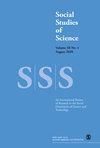清洁暗物质探测器:一个本体论和规范难以捉摸的案例
IF 2.7
2区 社会学
Q1 HISTORY & PHILOSOPHY OF SCIENCE
引用次数: 0
摘要
实验室科学至关重要地依赖于实验的清洁。但什么是干净?在这篇文章中,我们表明,通过其关系到一个特定的本体论曲目估值清洁的显著性出现。我们的例子是在意大利格兰萨索山脉进行的XENONnT实验,该实验旨在以假想的wimp(弱相互作用大质量粒子)的形式探测暗物质。在这个实验中,污垢表现出明显的干扰,因为污染物可以模拟wimp的信号,而电负性分子有可能消除这种信号。理想的清洁度要求使得清洁XENONnT探测器的实践非常困难。到目前为止,本体论的问题“wimp存在吗?”,这意味着规范性问题“探测器是否足够干净?”的问题也无法回答。此外,更多的清洁将使探测器对无法去除的中微子的背景敏感——因此无法挽回的脏。由于“干净探测器”的规范目标遥不可及,本体论问题“wimp存在吗?”也必然会保持开放。因此,不同的实验寻找不同的假设暗物质候选者,使用不同的设备,需要不同的清洁度。与此同时,XENONnT实验必须在其自身的清洁目标和旨在确保格兰萨索国家公园环境清洁的规则之间解决紧张关系。打扫原来很脏。这让我们不禁要问:哪些东西值得珍惜?与此交织在一起的是,哪些现实值得关心?本文章由计算机程序翻译,如有差异,请以英文原文为准。
Cleaning a dark matter detector: A case of ontological and normative elusiveness
Laboratory sciences crucially depend on the cleanliness of experiments. But what is clean? In this article, we show that the salience of the valuation clean emerges through its relation to a particular ontological repertoire. Our case is the XENONnT experiment in the Gran Sasso Mountains of Italy, designed to detect dark matter in the form of hypothetical WIMPs (Weakly Interacting Massive Particles). In this experiment, dirt presents a significant disruption, as contaminations can mimic the signals of WIMPs, and electronegative molecules risk erasing such signals. The ideosyncratic cleanliness required makes the practice of cleaning the XENONnT detector exceedingly difficult. So far, the ontological question ‘do WIMPs exist?’ remains open, which means that the normative question ‘is the detector clean enough?’ cannot be answered either. In addition, more cleaning will make the detector sensitive to a background of unremovable neutrinos—hence irredeemably dirty. With the normative goal of a ‘clean detector’ out of reach, the ontological question ‘do WIMPs exist?’ is bound to remain open as well. Alternative experiments therefore hunt for different hypothetical dark matter candidates, with different equipment, requiring different kinds of cleanliness. At the same time, the XENONnT experiment must navigate tensions between its own cleanliness goals and rules meant to ensure the environmental cleanliness of the Gran Sasso National Park. Cleaning turns out to be dirty. This leads us to ask: Which goods deserve to be cherished, and, intertwined with that, which realities deserve to be cared for?
求助全文
通过发布文献求助,成功后即可免费获取论文全文。
去求助
来源期刊

Social Studies of Science
管理科学-科学史与科学哲学
CiteScore
5.70
自引率
6.70%
发文量
45
审稿时长
>12 weeks
期刊介绍:
Social Studies of Science is an international peer reviewed journal that encourages submissions of original research on science, technology and medicine. The journal is multidisciplinary, publishing work from a range of fields including: political science, sociology, economics, history, philosophy, psychology social anthropology, legal and educational disciplines. This journal is a member of the Committee on Publication Ethics (COPE)
 求助内容:
求助内容: 应助结果提醒方式:
应助结果提醒方式:


